Stephanie Golden's Blog
May 29, 2018
My radio interview: “singular they”

“Have I ever mentioned that I  DC,” by Ted Eytan, licensed under CC BY-SA 2.0, cropped from original
DC,” by Ted Eytan, licensed under CC BY-SA 2.0, cropped from original
A radio host read my essay on they as a singular pronoun, so I got to advocate for this usage on KGO ‘s Maureen Langan Show in San Francisco. I explained that in order to know for sure what pronouns someone uses, you need to ask. “That’s a lot of pressure on me,” Maureen objected. She wanted to know why she should go out of her way to use this pronoun in such a weird, awkward way, so I told her.
It was a nice opportunity to evangelize a bit. Language is embedded deep in our brains, so even political progressives who support people who identify as nonbinary often resist using they to refer to a single specific individual. It just feels wrong. When my essay came out I got a range of messages, from which I concluded that people’s responses to language aren’t always logical.
Or they’re too logical. One person suggested that, logically, we should use it for someone who isn’t a he or a she. In my opinion people wouldn’t take kindly to being called it. So I suggested an experiment: try calling a few people it and see what kind of response came back. It makes an interesting thought experiment, doesn’t it?
Maureen was also curious about a different word-related issue, one that has surprisingly passionate advocates on both sides of the question: do you type two spaces after a sentence, or not? I’ll tackle that in the next post.
The post My radio interview: “singular they” appeared first on Stephanie Golden.
February 24, 2018
We need the singular “they” – and it won’t seem wrong for long
My latest essay just went up on Aeon.co.
It’s a historical perspective on the controversy over “they” as a singular, gender-neutral pronoun. Based on my experience as a copyeditor on the front lines during two earlier major usage shifts, it argues that using “they” is fundamentally an issue of social justice.
The post We need the singular “they” – and it won’t seem wrong for long appeared first on Stephanie Golden.
October 1, 2017
Let your unconscious solve your writing problems
I’m a writing mentor for a teenage girl, so I’m always looking for ways to help her dive beneath the surface level of her writing and connect with her own creativity. Often this means retrieving various lessons I absorbed from my own mentors over the years.
Here’s one that solves a lot of writing problems: go to sleep and let your unconscious do the work.

Embroidered bags from Greece, mid-19th century, New York Public Library Digital Collections
I learned this tactic from an author whose book I edited when I worked for a publisher. Carol (I’ll call her) was preceded by her reputation: she drove everyone crazy. But when I met her I realized she was just extremely right-brained, by which I mean she operated as far from logic and linear thinking as a person could and still be a full professor at a prestigious, male-dominated university. She had gotten her Ph.D., at a time when few women got Ph.D.’s, at another, similar university that was then quite hostile to women scholars, especially those who didn’t “think like men.” As I reconstruct it, she survived by surrounding herself with a kind of fog that made everything slightly unclear, effectively bamboozling the male professors who otherwise would have prevented her from doing her research the way she wanted.
She’d certainly created a muddle at my office. Her book was to have many illustrations, but nobody knew exactly how many. The acquiring editor, the art director, the production department, all gave me a different number. Under cover of this confusion Carol was set to slip far too many photos into her book, except that I went and checked her contract. When she showed up with an armload of prints, I said, “Your contract only calls for 100, so you have to cut 20 of these.” To my surprise, she went off happily and did it. I realized later that when she met me she knew intuitively that I couldn’t be muddled but was also very much on her wavelength—and she was actually relieved that I had cut through the confusion.
So we got to be friendly, and she told me a couple of stories about how she worked that shape how I function to this day.
Back before computers (not to mention the internet), authors took notes using index cards. On each card you recorded one fact (or maybe a couple of related facts). You organized your book by arranging your cards. Most people filed them in shoeboxes. One box might hold all the cards for a chapter, sorted in order. You pulled each card in turn out of the box and wrote its fact into your text.
But Carol made notes on little slips of paper which she threw into a bag. Whenever she needed to find one, she had to paw through the entire contents. (Knowing her, I visualize it as an embroidered silk or velvet bag.) “It took me six months longer than anyone else to write my dissertation,” she told me, “but going through all my research over and over like that enabled me to thoroughly absorb it and deeply integrate it into my thinking.”
This story inspired me when I did my own research for my two books, Slaying the Mermaid and The Women Outside. I disliked index cards, so I took notes on yellow lined pads. (No laptops then to take to the library; no phones to photograph pages.) My facts weren’t as thoroughly mixed up as Carol’s, but I still had to read through everything when I was hunting some detail. Computer searches are a lot more efficient, but Carol was right—your material doesn’t sink in in the same way.
Even more invaluable was Carol’s second tip.
“When I have a writing problem,” she confided, “I just put it into my mind before I go to sleep at night. Then in the morning, I know the answer.”
I’ve never done this precisely, but I’ve learned that the unconscious does a lot of work in the background while you’re otherwise occupied. If I’m not sure exactly how to frame an article, or how to express a certain idea, I have a choice: I can sit at my desk for hours and beat my brains out trying to come up with a solution. Or I can write the piece out as best I can, then put it aside and forget it for a couple of days. When I next pull it up onscreen, I pause at the first problematic passage and the right phrasing or idea pops into my head.
This is why I try never to let assignments go til the last minute. I always want about two days of off-time to let my unconscious do the heavy lifting. Not that I don’t still sweat my brains out. But I do it so much more efficiently!
The post Let your unconscious solve your writing problems appeared first on Stephanie Golden.
July 2, 2017
Ebook sale: Women & self-sacrifice
For the rest of July, “Slaying the Mermaid: Women and the Culture of Sacrifice” is reduced to 99 cents; “Mermaid No More: Breaking Women’s Culture of Sacrifice” is FREE.
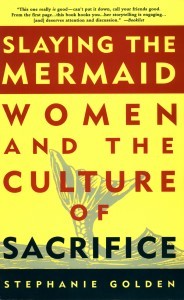 “Slaying the Mermaid” is the first book to show why women’s impulse toward excessive self-sacrifice comes from Western culture, not their nature. It explains the difference between a sacrifice that’s full of self-love—empowering and even transformative—and one that’s self-defeating.
“Slaying the Mermaid” is the first book to show why women’s impulse toward excessive self-sacrifice comes from Western culture, not their nature. It explains the difference between a sacrifice that’s full of self-love—empowering and even transformative—and one that’s self-defeating.
“Mermaid No More” is a brief update of “Slaying the Mermaid” that offers pragmatic, specific strategies to figure out if you’re sacrificing more than is good for you (and everyone around you) and then to stop doing so. 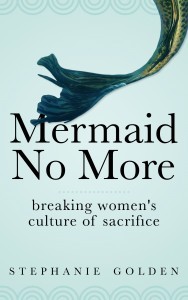
This sale is available only on the ebook platform Smashwords. You can get any format you like: Kindle, epub, PDF, and more, but you need to go to the book’s page and use the coupon code at the upper right.
For instructions on how to load the file onto your device, go to the home page and click the FAQ.
Here are the book pages:
https://www.smashwords.com/books/view/51865
https://www.smashwords.com/books/view/658451
The post Ebook sale: Women & self-sacrifice appeared first on Stephanie Golden.
February 21, 2017
More trumpery, and questions of “meaning”
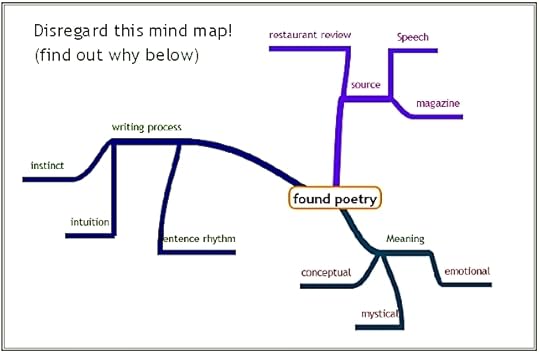
I didn’t intend to do another “found” poem from a Trump speech, but the following passage, sent by my friend Sallie Reynolds, was irresistible. It’s one single sentence.
You choose: read it first, or read the two poems below it first: by me and Winkie Ma, a high-school senior whom I mentor in a writing program. Found poetry was one of our assignments. I brought the passage to a mentoring session and each of us tackled it.
Here goes, hold on to your rational mind:
Look, having nuclear—my uncle was a great professor and scientist and engineer, Dr. John Trump at MIT; good genes, very good genes, OK, very smart, the Wharton School of Finance, very good, very smart—you know, if you’re a conservative Republican, if I were a liberal, if, like, OK, if I ran as a liberal Democrat, they would say I’m one of the smartest people anywhere in the world—it’s true!—but when you’re a conservative Republican they try—oh, do they do a number—that’s why I always start off: Went to Wharton, was a good student, went there, went there, did this, built a fortune—you know I have to give my like credentials all the time, because we’re a little disadvantaged—but you look at the nuclear deal, the thing that really bothers me—it would have been so easy, and it’s not as important as these lives are (nuclear is powerful; my uncle explained that to me many, many years ago, the power and that was 35 years ago; he would explain the power of what’s going to happen and he was right—who would have thought?), but when you look at what’s going on with the four prisoners—now it used to be three, now it’s four—but when it was three and even now, I would have said it’s all in the messenger; fellas, and it is fellas because, you know, they don’t, they haven’t figured that the women are smarter right now than the men, so, you know, it’s gonna take them about another 150 years—but the Persians are great negotiators, the Iranians are great negotiators, so, and they, they just killed, they just killed us.
Here’s Winkie’s poem:
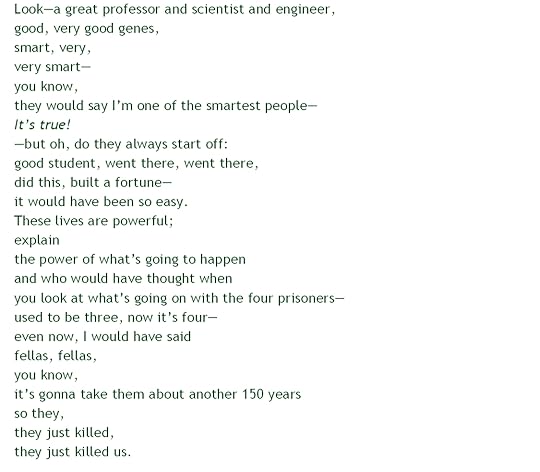
And mine:
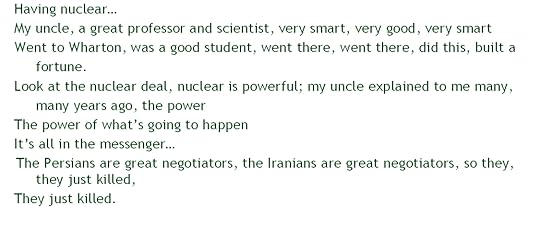
Of course I sent both our poems to Sallie. Her response:
Winkie’s made me cry. Yours seems to me to be about chilling killing power. She turns it to the personal. They just killed us. . . You wrote from the viewpoint of the man as cold killer, and Winkie wrote from the viewpoint of the victims.
What?? was my reaction. Never having intended anything like that, I asked for clarification.
Yours is a man bragging, “smart, very smart, etc.,” connecting himself with past brilliance. Then the voice slides into nuclear stuff. And power. The forces he speaks of used their intelligence and their power to kill—and as in dreams, these fragmentary statements are about the self of the speaker. He is a cold killer. He is also blaming others.
Winkie’s starts with the same brag, then onto the power, and she begins to slip into the voice of the victim, I think, with the line “These lives are powerful, explain the power of what’s going to happen . . . ” and steadily grows into the new voice, the victims’ voices, the prisoners’, to “they are killing us.”
I created my found poems, this one included, based purely on instinct—or intuition, or a kind of ear—without thinking too much. If I thought anything, it was that I was distilling an essence of Trump. It was more about the rhythm or the music of the language, his stream-of-consciousness thought process and his repetition, than about concepts. There’s something so destructive of clear cognition in the way he uses language. So I told Sallie it was startling to receive such a specific conceptual interpretation.
She responded:
When a reader finds something one has done “purely by instinct” to have a meaning one hasn’t intended, it has more credibility than if you had had a conscious vision and the reader is seeing something else.
So naturally I asked Winkie what she herself saw in her Trump poem. “I look for rhythm first and then sound,” she told me. “The language was so abrasive. I like to change the tone to give a new feel, so I think it did take on a more victim tone, but I didn’t have the word ‘victim’ in my head.”
You can see why we make such a successful mentor/mentee pair.
This experience of producing poetry made me think about how we produce meaning. My normal mode is writing nonfiction that requires deep, intensive thinking to make a point or argument clear. I think linearly—a mind map makes me dizzy. (That’s why the one above is so feeble. Besides, it’s ex post facto.) Nevertheless there’s a lot of intuition in my writing process: it’s by listening to the rhythm of the sentences that I determine whether I’ve really said what I mean. But in these found poems that’s all I listened to. And if I created meaning, it was one I was unaware of (not something you could say about my books). So is that a different degree/type/level of meaning?
The post More trumpery, and questions of “meaning” appeared first on Stephanie Golden.
December 30, 2016
More poems found in unlikely places
Two more poems from nonpoetic sources.

Juan Gris, Portrait of the Artist’s Mother
I put the source of the first one after the poem itself, because I’m curious how easily you can tell what it’s about. Please leave a comment letting me know.
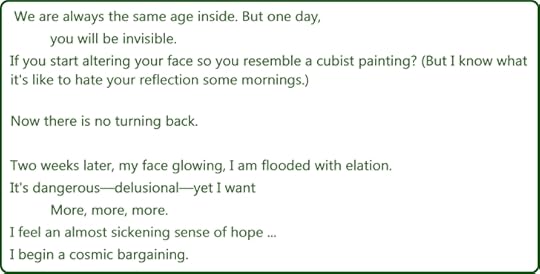
This poem was—how shall I say?—carved out of an article in the January 2017 Vogue, describing its author’s ambivalence about having plastic surgery, then having it anyway. Sorry, no link—it isn’t online. And I don’t have a copy of the original page because it wasn’t my magazine and I didn’t feel I could rip out the pages.
This next one comes from an interview in the Dartmouth Alumni Magazine.
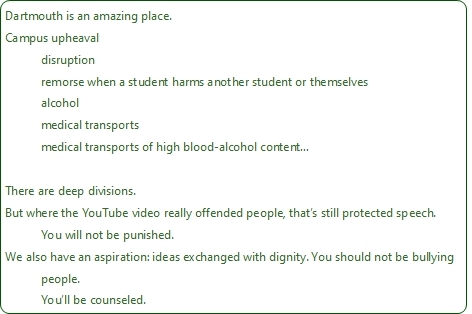
In these days especially, I appreciate this generous, even open-hearted posture. Here’s one of the original pages:
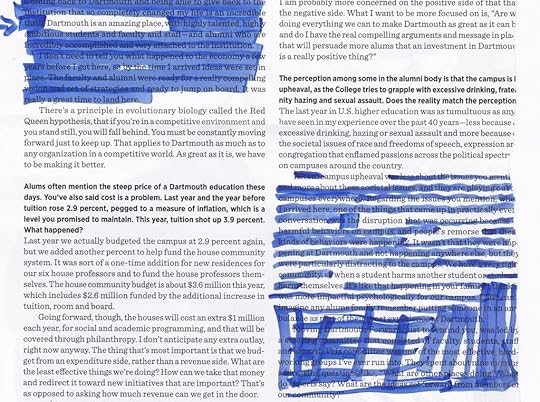
These are such fun to do, and they’re easy. So I wondered why this form worked right away for me, while it didn’t for my mentee, who’s a really good poet but had difficulty getting the hang of it.
I decided it has to do with my long experience as an editor, book doctor, and ghostwriter. I’ve trained myself to spot the evocative, resonant phrases in a disorganized mass of text. I can perceive the underlying logic of a disordered string of sentences and reassemble them to express it. And I’ve learned to write and edit in other people’s voices (notably, writing an entire book in the he-man voice of a gym rat and bodybuilder). In the same way, a found poem distills an original text into an essence. At least I feel these do, in a weird way.
I suspect that in the hands of a real poet, found poetry would be a whole lot more, but I’m happy just to discover a knack for something I never thought I could do.
The post More poems found in unlikely places appeared first on Stephanie Golden.
December 22, 2016
“Found” Trump poem
“Atlas Slave.” Photo Jörg Bittner Unna (Own work) [CC BY-SA 3.0 (http:// creativecommons. org/licenses/by-sa 3.0)], via Wikimedia Commons
This month’s assignment for my Girls Write Now mentoring program was “found poetry.”There are several ways to “find” a poem, but our assignment was an “erasure poem,” where you take an existing text and black out lines and words. The poem is what’s left, rather like Michaelangelo and the block of marble.
I was in a stream-of-consciousness sort of mood, so I downloaded a transcript of a Trump campaign speech, and to my surprise—since I’m in no way a poet—produced something that I rather like. (WordPress doesn’t let me reproduce the line breaks nicely, so I turned it into a photo, below.)
Just to give you an idea of how it works, below the poem itself is one worked-over page from the original. The transcript was five pages, and I used only a few fragments. I inserted some punctuation, but didn’t change the order of any of the pieces of text.
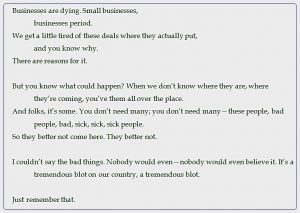
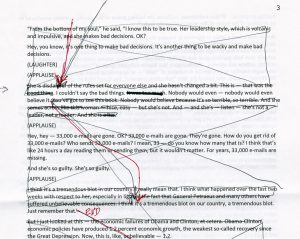
I had so much fun that I did a couple of others which I’ll put in the next post, along with some ideas about why this worked for me, while actually writing poetry doesn’t.
The post “Found” Trump poem appeared first on Stephanie Golden.
September 29, 2016
The Trojan Purse and the subversive woman
 This ten-foot high wooden purse on wheels was part of a week-long art festival in Prospect Park, Brooklyn. Happily for me the artist, Ethan Crenson, was on hand the day I came upon it, conducting dialogues with curious passersby.
This ten-foot high wooden purse on wheels was part of a week-long art festival in Prospect Park, Brooklyn. Happily for me the artist, Ethan Crenson, was on hand the day I came upon it, conducting dialogues with curious passersby.
Why a “Trojan” purse? Was it filled with some kind of subversive material? No, Crenson told me. It was empty. The idea was that everyone could project their own feelings or ideas into it—anger at capitalism, the political system, whatever. I didn’t ask him why he’d chosen to make it a purse—probably because my own imagination immediately supplied a rationale.
Betty Lehan Harragan’s wonderful book Games Mother Never Taught You: Corporate Gamesmanship for Women was published in 1977, at a time when the first generation of women were trying to rise through the ranks in corporate America. It was a primer for these would-be executives, who found themselves baffled and frustrated by a set of mysterious rules of the game that all the men knew to follow. They played their positions and scored, while the women fumbled and dropped the ball. Aside from revealing these unspoken rules, Harragan offered brilliant advice to enable women executives—whose mere presence was then an unsettling anomaly in a corporate workplace—to avoid inadvertent behavior that would disturb men even more.
 One of her cautions: never bring your purse into a meeting or business lunch. Men, Harragan explains, unconsciously equate a woman’s handbag with her womb, and seeing it in a business setting disorients them. A purse is acceptable when a woman is present as a sexual/reproductive object. But the message it telegraphs in a business setting is fatal to her attempt to be accepted as one of the team.
One of her cautions: never bring your purse into a meeting or business lunch. Men, Harragan explains, unconsciously equate a woman’s handbag with her womb, and seeing it in a business setting disorients them. A purse is acceptable when a woman is present as a sexual/reproductive object. But the message it telegraphs in a business setting is fatal to her attempt to be accepted as one of the team.
Of course many feminists of the seventies had no interest in the corporate boardroom, but learning how the system worked enabled us to use it to pursue our own objectives. I worked for a book publisher, and Harragan’s explanation of the male perspective on asking for a raise was a revelation to me. They expect you to ask, she said. And ask for a lot—they don’t get mad, they respect you for it even if they say no. I screwed up my nerve, followed her scenario exactly—and got myself a raise that allowed me to work part time and write my first book. (I didn’t even have to negotiate—they just said yes! I should have asked for more.)
I don’t know what other projections Ethan Crenson heard that day, but I’ll bet there were a lot of them. Like a womb, an empty space has a generative power.
The post The Trojan Purse and the subversive woman appeared first on Stephanie Golden.
August 30, 2016
My Girls Write Now mentee in Newsweek!
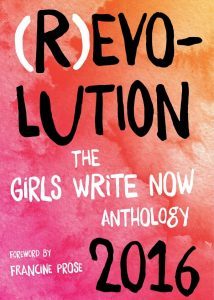 Every June, Girls Write Now, where I volunteer as a writing mentor for a teenager, publishes an anthology of specially polished pieces by that year’s group of girls. This year Newsweek ran a big story on the GWN program, featuring six selections from the anthology. And one was by my own mentee, Winkie Ma! I am beyond thrilled.
Every June, Girls Write Now, where I volunteer as a writing mentor for a teenager, publishes an anthology of specially polished pieces by that year’s group of girls. This year Newsweek ran a big story on the GWN program, featuring six selections from the anthology. And one was by my own mentee, Winkie Ma! I am beyond thrilled.
Her piece came out of one of GWN’s monthly genre workshops: Dystopian Flash Fiction. I had vaguely heard of flash fiction but had never met it, so to speak. I haven’t written fiction since my 20s, so a fiction workshop is a challenge for me. Adding a 500-word limit and making the piece dystopian didn’t make it easier. I was happy to find myself producing a bare-bones concept of a piece with a strong theme and a twist at the end that could actually be done in 500 words (currently on my list of things-to-work-on).
 But Winkie, an aficionado of movies like Divergent, who like many teenage girls has a taste for fantasy fiction, wasn’t fazed. She produced a draft of a“dark” tale easily. Then, sitting in our customary writing haunt—the café in a Brooklyn Target—we edited out every extraneous word. Scroll down in the Newsweek article to read her piece, “Three Reflections.” It’s a good demonstration that tight word limits are excellent for focusing the mind.
But Winkie, an aficionado of movies like Divergent, who like many teenage girls has a taste for fantasy fiction, wasn’t fazed. She produced a draft of a“dark” tale easily. Then, sitting in our customary writing haunt—the café in a Brooklyn Target—we edited out every extraneous word. Scroll down in the Newsweek article to read her piece, “Three Reflections.” It’s a good demonstration that tight word limits are excellent for focusing the mind.
The post My Girls Write Now mentee in Newsweek! appeared first on Stephanie Golden.
August 15, 2016
Self-sacrificing women: free tipsheet for you
 How many men would eat food they don’t like because their wife likes it? Or wear clothes they don’t like because she wants them to look a certain way? Women do these things all the time. I did them with my former husband.
How many men would eat food they don’t like because their wife likes it? Or wear clothes they don’t like because she wants them to look a certain way? Women do these things all the time. I did them with my former husband.
In my book Slaying the Mermaid: Women and the Culture of Sacrifice, which uses Andersen’s Little Mermaid as an image of the ultimate self-sacrificing woman, I investigated why so many women feel obliged to put other people’s needs first—even when they don’t want to. I discovered that the self-sacrificing impulse comes from women’s history, not their nature.
Recently a therapist contacted me to say that excessive self-sacrifice was a big problem for her clients, and I decided to revisit this subject. I did more research and reporting, and the result is a brief new ebook, Mermaid No More: Breaking Women’s Culture of Sacrifice, available for preorder.
Mermaid No more offers pragmatic, specific strategies for figuring out whether you too are a “modern mermaid” and for overcoming your own personal pull toward unhealthy self-sacrifice. It’s now available for preorder on Amazon (release date is Sept 1) and will be up on Smashwords soon, in formats that can be read on every kind of device.
In the meantime, you can preview it by downloading my free tipsheet (see sidebar on right). Most women are prone to unconscious, involuntary, self-defeating self-sacrifice, due to our training in what I call the “culture of sacrifice.” See if you recognize yourself in any of the indicators.
And you can leave your own thoughts about self-sacrifice on the Mermaid No More web page.
The post Self-sacrificing women: free tipsheet for you appeared first on Stephanie Golden.





